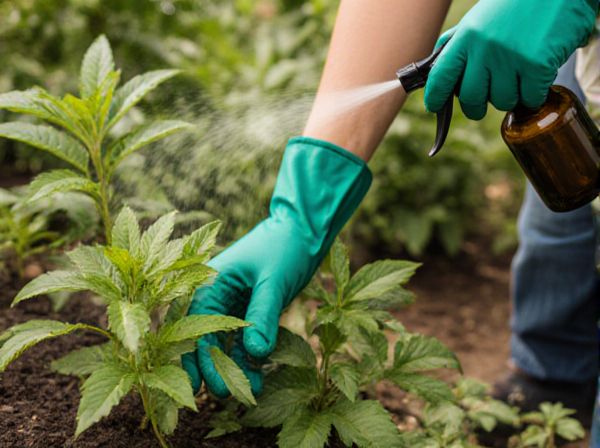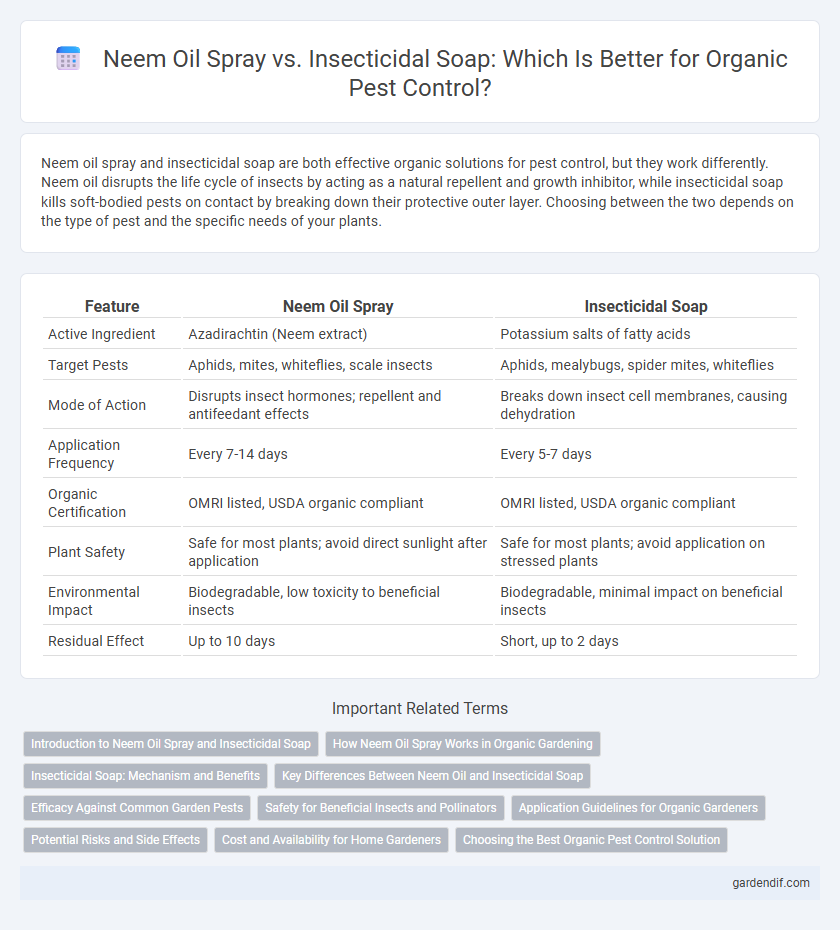
Neem oil spray vs Insecticidal soap Illustration
Neem oil spray and insecticidal soap are both effective organic solutions for pest control, but they work differently. Neem oil disrupts the life cycle of insects by acting as a natural repellent and growth inhibitor, while insecticidal soap kills soft-bodied pests on contact by breaking down their protective outer layer. Choosing between the two depends on the type of pest and the specific needs of your plants.
Table of Comparison
| Feature | Neem Oil Spray | Insecticidal Soap |
|---|---|---|
| Active Ingredient | Azadirachtin (Neem extract) | Potassium salts of fatty acids |
| Target Pests | Aphids, mites, whiteflies, scale insects | Aphids, mealybugs, spider mites, whiteflies |
| Mode of Action | Disrupts insect hormones; repellent and antifeedant effects | Breaks down insect cell membranes, causing dehydration |
| Application Frequency | Every 7-14 days | Every 5-7 days |
| Organic Certification | OMRI listed, USDA organic compliant | OMRI listed, USDA organic compliant |
| Plant Safety | Safe for most plants; avoid direct sunlight after application | Safe for most plants; avoid application on stressed plants |
| Environmental Impact | Biodegradable, low toxicity to beneficial insects | Biodegradable, minimal impact on beneficial insects |
| Residual Effect | Up to 10 days | Short, up to 2 days |
Introduction to Neem Oil Spray and Insecticidal Soap
Neem oil spray, derived from the seeds of the Azadirachta indica tree, functions as a natural pesticide by disrupting insect growth and feeding behavior, making it effective against aphids, whiteflies, and spider mites. Insecticidal soap consists primarily of potassium salts of fatty acids, targeting soft-bodied pests by breaking down their outer protective layer and causing dehydration. Both options offer organic pest control solutions that are biodegradable and safe for beneficial insects when applied correctly.
How Neem Oil Spray Works in Organic Gardening
Neem oil spray works by disrupting the hormonal balance of pests, preventing their growth and reproduction, making it highly effective against aphids, whiteflies, and spider mites in organic gardening. It acts as a natural insect repellent and antifungal agent, protecting plants without harming beneficial insects or soil microorganisms. Regular application of neem oil spray supports sustainable pest management while maintaining the ecological balance of organic gardens.
Insecticidal Soap: Mechanism and Benefits
Insecticidal soap operates by penetrating the insect's outer shell, disrupting cell membranes and causing dehydration, effectively targeting soft-bodied pests like aphids and mites. Its biodegradable composition ensures minimal environmental impact and rapid degradation, making it safe for beneficial insects and organic gardening. Frequent application can prevent pest resistance, enhancing long-term plant health and protection.
Key Differences Between Neem Oil and Insecticidal Soap
Neem oil spray is derived from the seeds of the neem tree and contains azadirachtin, providing systemic pest control and antifungal properties, while insecticidal soap is made from potassium salts of fatty acids and works primarily by disrupting insect cell membranes. Neem oil targets a broad spectrum of pests including aphids, mites, and whiteflies, and also inhibits fungal growth, whereas insecticidal soap is most effective against soft-bodied insects like aphids, mealybugs, and spider mites without residual soil activity. Neem oil's slower action contrasts with the quick knockdown effect of insecticidal soap, making neem oil better suited for integrated pest management in organic gardening.
Efficacy Against Common Garden Pests
Neem oil spray effectively controls aphids, whiteflies, and spider mites by disrupting their growth and reproduction. Insecticidal soap targets soft-bodied pests like aphids and mealybugs by breaking down their cell membranes, causing dehydration. Neem oil offers longer residual protection, while insecticidal soap provides rapid pest knockdown with minimal risk to beneficial insects.
Safety for Beneficial Insects and Pollinators
Neem oil spray offers targeted pest control while being relatively safe for beneficial insects and pollinators when used correctly, as it primarily affects chewing and sucking pests without harming bees or ladybugs. Insecticidal soap, composed of potassium salts of fatty acids, works by disrupting the cell membranes of soft-bodied pests but can pose risks to non-target insects if applied during active foraging periods. Both treatments require careful timing and application methods to minimize adverse effects on pollinators such as honeybees, bumblebees, and predatory insects that support organic garden health.
Application Guidelines for Organic Gardeners
Neem oil spray and insecticidal soap serve as effective organic pest control solutions with distinct application guidelines to maximize their efficacy. Neem oil spray should be applied during early morning or late evening to avoid leaf burn, using a dilution ratio of about 2 teaspoons per gallon of water, and requires thorough coverage on both leaf surfaces to disrupt pest life cycles. Insecticidal soap demands direct contact with pests, is best applied every 5-7 days, and must target soft-bodied insects while avoiding use during hot or sunny periods to prevent plant damage.
Potential Risks and Side Effects
Neem oil spray may cause leaf burn or phytotoxicity on sensitive plants if applied in direct sunlight or at high concentrations, while insecticidal soap primarily targets soft-bodied insects but can harm beneficial insects like pollinators with repeated use. Both treatments can lead to plant stress or damage if overused, and users should carefully follow application guidelines to minimize adverse effects. Organic gardeners often prefer neem oil for its systemic properties but remain cautious of its potential to disrupt natural pest predators.
Cost and Availability for Home Gardeners
Neem oil spray offers a cost-effective solution for home gardeners, with prices typically ranging from $10 to $20 per quart and widespread availability at garden centers and online retailers. Insecticidal soap generally costs between $8 and $15 per bottle, is similarly accessible, and provides a budget-friendly option for treating common garden pests. Both products are affordable and readily obtainable, but insecticidal soap often comes in smaller packaging suited for minor infestations, while neem oil's concentrated formula can be diluted to extend its use.
Choosing the Best Organic Pest Control Solution
Neem oil spray offers a broad-spectrum organic pest control solution by targeting a wide variety of insects and fungal issues while acting as a natural growth regulator. Insecticidal soap provides rapid knockdown of soft-bodied pests like aphids and whiteflies through direct contact, making it highly effective for immediate pest eradication. Selecting the best option depends on pest type, plant sensitivity, and desired residual effects, with neem oil favored for longer-lasting protection and insecticidal soap preferred for quick, surface-level control.
Neem oil spray vs Insecticidal soap Infographic

 gardendif.com
gardendif.com